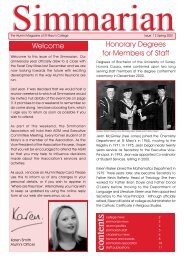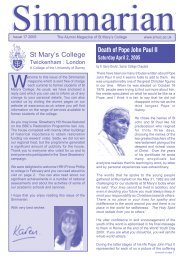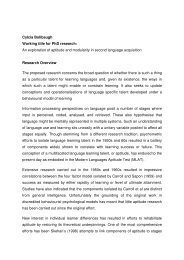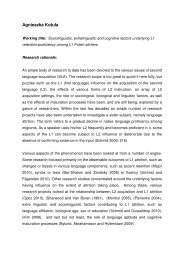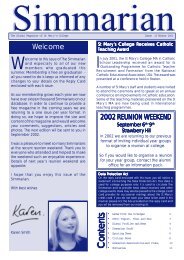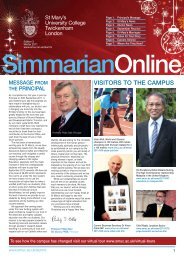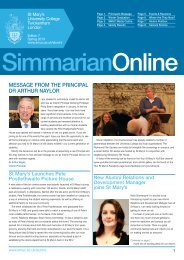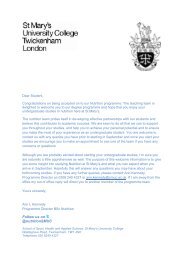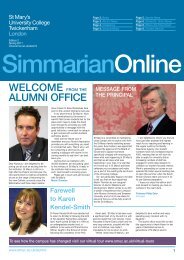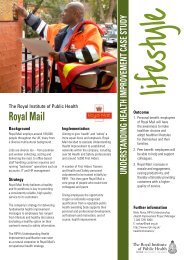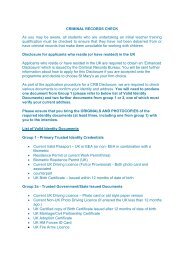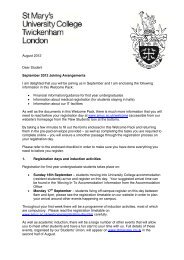letter
letter
letter
Create successful ePaper yourself
Turn your PDF publications into a flip-book with our unique Google optimized e-Paper software.
Dear Student,<br />
Congratulations on being accepted to the Sociology programme. The teaching team is delighted to<br />
welcome you to our degree programme and hope that you enjoy your undergraduate studies here<br />
at St Mary’s. Although you are probably excited about starting your undergraduate studies, I’m<br />
sure you are naturally a little apprehensive as well. I want to reassure you that this initial feeling is<br />
natural and will soon give way to a sense of confidence, understanding and control. The<br />
programme is committed to promoting a supportive teaching and learning environment in which<br />
you are able to flourish. I am writing this welcome <strong>letter</strong> to give you some information you may find<br />
useful before you join us in September to study sociology.<br />
In deciding to study sociology, you are embarking on an exciting intellectual journey about the rise<br />
of modern society. This journey shows the connections between contemporary institutions and<br />
those of the past that continue to impact our lives. The journey tells us that our human<br />
relationships are shaped by forces that we need the systematic study of sociology to help us to<br />
understand and change. We hope that at the end of your study you will experience what our<br />
graduates tell us: that sociology ‘opened the world’ and allowed them to successfully apply the<br />
knowledge and understanding gained in their study to their chosen career.<br />
In your first year you will need to achieve a total of 120 credits across your two subjects. All our Sociology students<br />
take up to three modules in their first year, worth 60 credits in total. They are:<br />
Semester 1 Semester 2<br />
Core Modules<br />
20SCY4000 Sociology Themes and Issues (core)<br />
20SCY204002 Studying Sociology and the<br />
Everyday<br />
20SCY4001 Classical Sociological Theory<br />
(core)<br />
20SCY4003 Criminology: A sociological<br />
Introduction<br />
(There are other cross validated modules available from other subject areas<br />
20SCY4004 Media and Visual Sociology<br />
20SCY4005 Researching sociology in the<br />
News
Brief details of these modules are given overleaf.<br />
Each of these modules will have set texts attached to them and you might like to read, and possibly buy these,<br />
particularly if you have not studied sociology before. The following are for the core modules:<br />
For Sociology Themes and Issues we recommend Anthony Giddens, (2009) Sociology 6 th<br />
Edition, published by Polity Press.<br />
For Classical Sociological Theory we recommend Hughes J, Sharrock W, & Martin P (2003)<br />
Understanding Classical Sociological Theory, 2 nd Edition, Sage<br />
We have limited our suggestion of books for the core modules. The module convenors for the<br />
options will give you advice on recommend books at the start of the module.<br />
These are my 5 useful points for preparing for study on our degree:<br />
1. Books: form a key tool of your study. All modules will have a core book that you must buy and<br />
read.<br />
2) Familiarisation with sociology:<br />
Sociology is concerned with the social world, so any subject is of interest to sociology, nothing is<br />
bared. If you would like to acquaint yourself with the concerns of sociology you could read<br />
Giddens Sociology (2009) chapter 1: What is Sociology? You may have noticed that issues of<br />
inequality are prominent in the media because questions of inequality profoundly affect the life<br />
chances of groups in society. A book that looks at this subject is:<br />
Platt, L (2011) Understanding Inequalities, published Polity.<br />
Failing these suggestions, get into the habit of listening to the news and reading broadsheet news<br />
papers. For example you can access The Guardian Society, Education and Culture online at<br />
http://www.guardian.co.uk/ .<br />
3) What the first year will entail:<br />
In the first year you will be to be in sociology classes on Wednesdays and Fridays. You will be<br />
studying three core modules and one option. In these modules you will be introduced to the ways<br />
in which sociology makes sense of the institutional dimensions of social life; research methods,<br />
sociological theory, crime and deviance and visual representations of sociological issues. These<br />
classes are taught by lectures, seminars, workshops and library based activities. Assessment<br />
generally includes coursework, disclosed and opens exams.<br />
4) Class Participation: sociology is a discipline that requires reading and debate. It is important to<br />
attend your classes with the willingness and preparedness to discuss your ideas. This will enable<br />
you to become a member of an engaged and learning community. You will get the most from your<br />
studies if you are involved.<br />
5) The Basics: a sociology dictionary can prove to be very useful in explaining concepts and<br />
ideas.<br />
I hope you have an enjoyable summer and look forward to meeting you during induction in<br />
September.
Best Wishes<br />
Lemah Bonnick<br />
0208-240-4172<br />
bonnickl@smuc.ac.uk<br />
Kathy Grant (Office Administrator)<br />
0208-2404346<br />
Kathy.grant@smuc.ac.uk<br />
20SCY4000 Sociology Themes and Issues This module will introduce students to the key unit ideas of<br />
sociology through the exploration of processes and institutions with which they could be expected to have<br />
some familiarity. A limited number of themes will be studied in enough depth to encourage students to<br />
become accustomed to the prevalence of competing sociological perspectives in the study of any given<br />
area. Themes covered will come from the areas of social stratification, the family, the education system,<br />
work and employment, crime and deviance, ageing and the life course or the mass media and popular<br />
culture. Normally three themes will be studied in any one semester.<br />
20SCY4001 Classical Sociological Theory: The module aims to explore the relationship between the rise of<br />
Sociology as a distinct discipline in the 20 th Century and the growth of modern industrial society. As well as<br />
focusing upon the historical and intellectual context within which Sociology emerged, the module will<br />
assess how sociological thought understood the major institutional, cultural and social identities that are<br />
now considered the hallmarks of modernity itself. Emphasis will be given to the sociological traditions<br />
handed down to us by Durkheim, Marx and Weber and the continuity of their ideas in contemporary<br />
sociological debates about social life.<br />
20SCY4000 Studying Sociology and the Everyday<br />
This module will introduce students to studying sociology at undergraduate level. This will include input on<br />
study skills for undergraduates, as well as thinking about ‘everyday’ issues or activities that can be<br />
understood and analysed through the application of the sociological imagination. Topics will include<br />
shopping, fashion and food. Part of the module will include a field trip to conduct a sociological observation<br />
of these practices. The assessment will be practical, based on an evaluation of aspects of studying<br />
sociology, as well as a report of the observations from the field trip.<br />
20SCY4003 Criminology: A Sociological Introduction<br />
When I tell people I’m a criminologist they often ask me about serial killers or forensics says module coordinator,<br />
Nic Groombridge. Some criminologists, some detectives and more media focus on those. The<br />
sociology of crime is about more frequent crimes and the extent to which groups of people might commit<br />
crime, be accused of committing or be victims of. Whilst many of the theories may be classic the crime<br />
remain contemporary. Assessment is by an essay and on-going online activities.<br />
20SCY4003 Media and Visual Sociology: The module will look at a number of areas where visual media can<br />
help illuminate social life such as the visual representation of the social and cultural life of the city; the<br />
representations of poverty and inequality both in the UK and beyond; the representation of warfare,<br />
terrorism, conflict and genocide, the visual representation of migration, refugees, and globalisation; the<br />
visual representation of the relationship of society, the environment and the ecology; the visual<br />
representation of contemporary social movements such as the anti-capitalist and global justice<br />
movement(s).<br />
20SCY4005 Researching Sociology in the News<br />
Sociology is sometimes explicitly referenced in the media but is often implicit in the ‘problems’ discussed.<br />
Each week a case study from recent media reports will be examined and discussed in relation to classical
and contemporary sociological theory. Wider social policy, administration and social science will be<br />
included. An overview of approaches to the sociological analysis of documents will be provided. There will<br />
be on going short assignments related to discussions in seminars, and one final assessment developing<br />
these ideas further



